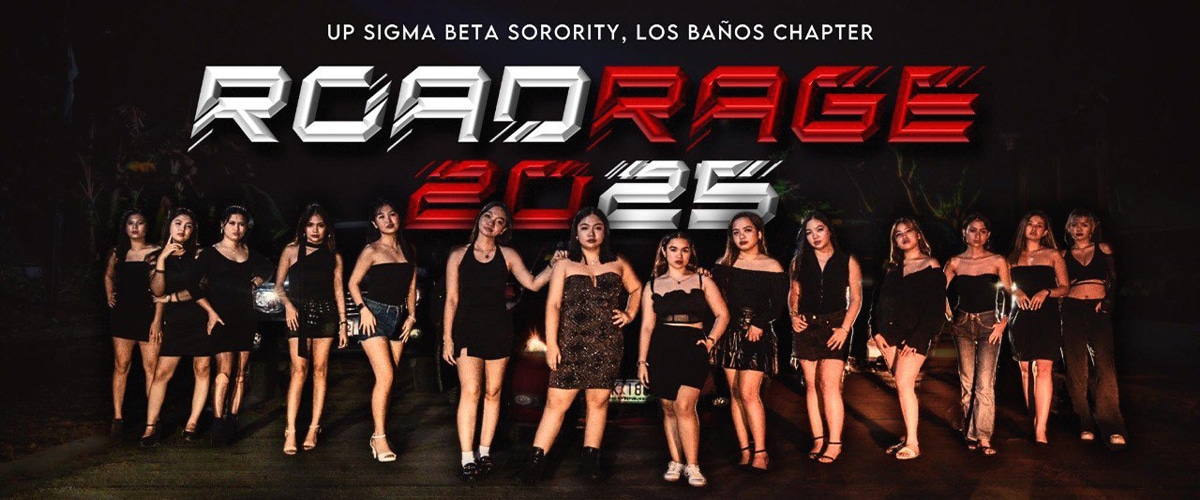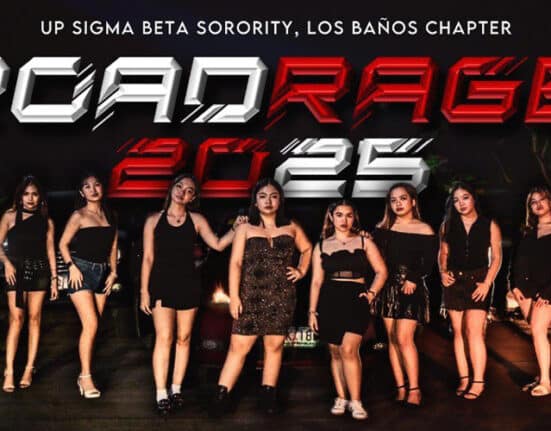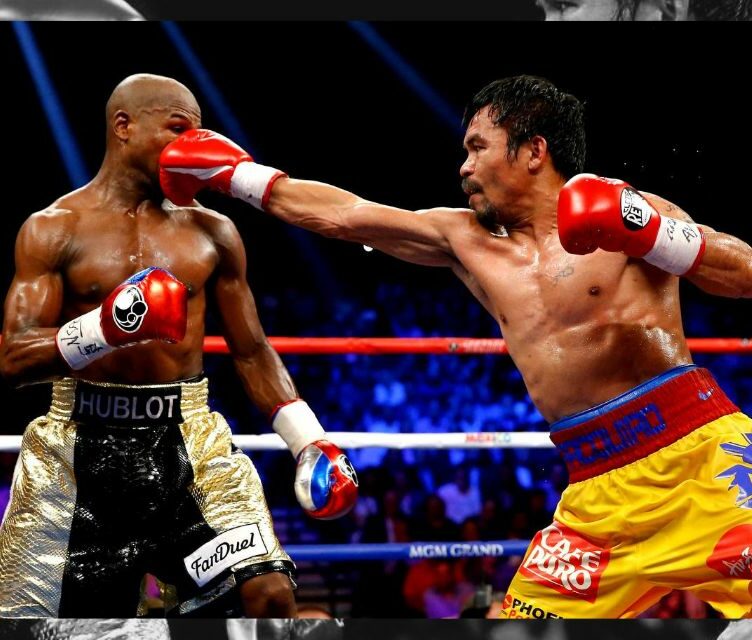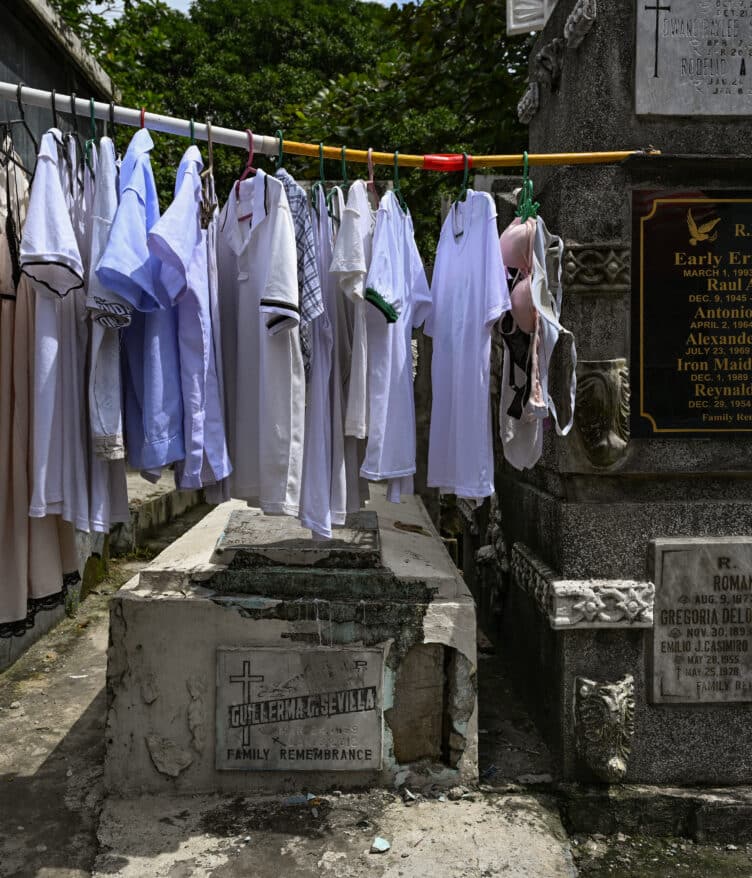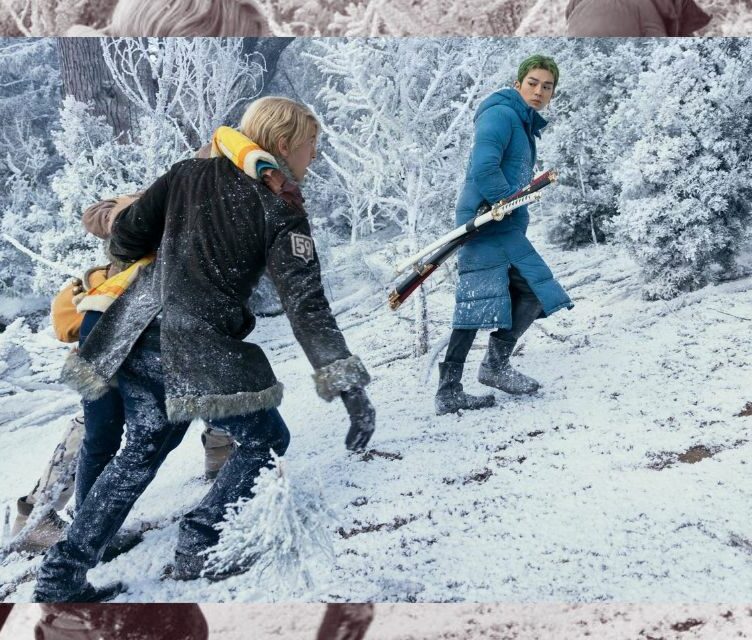AT University of the Philippines Los Baños (UPLB), February isn’t just a month— it’s a movement.
Every year, Feb Fair transforms the campus into a living, breathing space of protest, culture, and defiance. Student organizations set up booths, concerts blare from the open fields, and political statements fill the air.
It’s a time for advocacy, reclaiming spaces, and empowerment.
But not all protests unfold with placards and chants on the main stage. For the women advocates of UP Sigma Beta Sorority, resistance comes with the roar of engines and the rush of speed.
Pulse of the Pavement
Road Rage is more than just a term for aggressive driving— it’s a cornerstone of the car culture, referring to the organized car meets, exhibitions, and competitive driving events.
Enthusiasts gather to showcase custom-builds, test their vehicles performance, and celebrate the engineering and artistry behind every machine.
Whether through car shows, drift competitions, or time attack challenges, Road Rage serves as a space where skill and creativity take the spotlight, proving that the connection between driver and machine is more than just mechanical—it’s personal.
In the Philippines, the culture of Road Rage is a deeply male-dominated space. From underground drag races to high-profile car shows, the scene has long been shaped by men. The women are often relegated to the side, as spectators or models, rather than active participants.
This mirror’s a global trend where motorsports and car culture have historically been considered as “boys’ club”, with women facing stereotypes that question their technical knowledge and driving skills.
Fast, Furious, and Feminist
Despite the male-dominated car culture, a growing number of women in the Philippines are making their mark—not just as car show models, but as drivers, builders, organizers, and advocates for inclusivity in the automotive scene.
In 2002, a group of women students from the UP Sigma Beta Sorority at UPLB set out to carve their place in the car scene. Twenty-three years later, their legacy lives on— not just as a tradition, but as a form of resistance against a space in a culture long dominated by men.
“Road Rage began as a bold experiment— a response to the challenge of breaking away from traditional university events and creating something fresh, thrilling, and unexpected,” recalled Althea Cunanan-Hultqvist, one of the UP Sigma Beta Sorority members who pioneered the tradition in 2002.
“As sorority sisters, we were always looking for ways to innovate and stand out. At that time, car shows were gaining popularity, but they were mostly dominated by men,” she continued.
It was a lightbulb moment for the sisterhood, as the idea for a women-organized Road Rage appealed to them and their cause.
“We saw an opportunity to disrupt the scene, bring a new flavor to campus events, and prove that women could lead and execute something on that scale just as well—if not better. Road Rage became a statement, not just an event,” said Althea.
Along with her sorority sisters—Joan Prasser and Charelle Lopena— they devised the event the community would come to know as Road Rage.
But it wasn’t easy. Their first challenge was immersing themselves in the car culture scene; the next was proving their capability in the face of misogynistic skepticism directed at them simply because of their inherent sex.
“The car and motorsports scene in UPLB was tight-knit, with mostly male enthusiasts forming clubs and dominating the space,” Althea reminisced.
“At first, stepping into that world as women organizers felt like we were stepping onto unfamiliar ground, but we were confident in our vision. We weren’t just throwing an event; we were shifting perceptions and making space for women in a space where they weren’t typically seen as leaders.”
According to Althea, people doubted their ability to organize a full-blown car show. They struggled with convincing the stakeholders that they are serious with what they are doing.
“There was an underlying assumption that we didn’t know enough about cars or motorsports to pull it off,” she said.
“We also had to prove ourselves in logistics, sponsorships, and partnerships—convincing stakeholders that Road Rage wasn’t just another gimmick but a serious, high-caliber event.”
This might be a disheartening challenge for others, but the gender discrimination only fueled the sorority’s determination to steer the event toward success.
“We turned skepticism into motivation and made sure our execution was top-tier, earning the respect of both car enthusiasts and event organizers,” she said.
When the day of the reckoning finally came, the women’s hard work paid off. The response to their Road Rage was overwhelmingly positive.
“People were excited about something new, something that challenged the usual mold of campus events. The car community was intrigued, and even those outside the scene wanted to be part of it,” narrated Althea.
“There was an energy around Road Rage—something fresh, daring, and unexpected. Of course, there were some who were skeptical at first, but once they saw the execution, the turnout, and the impact, Road Rage quickly became a highly anticipated annual event.”
A Statement in Motion
Now, twenty-three years later, the event has become more than just a car show—it is a legacy, a lasting statement of resistance by women who continue to thrive and defy the stereotypes imposed by a patriarchal society.
“Road Rage has grown beyond just being a car show—it has become a legacy. Over the years, we’ve seen more women step up, take leadership roles, and make the event their own,” said Althea.
When she and her fellow pioneers graduated, they didn’t just leave—they handed over the keys, passing the ignition of Road Rage to the next generation of UP Sigma Beta sisters.
During last month’s Feb Fair, republicasia met the next generation of UP Sigma Beta sisters who have inherited the Road Rage legacy. We talked to their current president, Cheska Marcial— a 22-year old, BS Agriculture and Business Management student of UPLB.
Cheska, along with her sorority sisters, were continuing the Road Rage tradition every year, until they graduate and pass on the responsibility to the next generation of their sisterhood.
“Marami kaming events pero iba talaga ang fulfillment ng Road Rage,” said Cheska. It was the 21st installment of the event.
“Ramdam namin ‘yung impact no’ng fact na it’s a car show organized by women students,” she said.
According to her, the stereotype of the car culture being exclusive to men continues to persist— and they continue their fight against it.
“Minsan, sa Facebook page, may magme-message sa ‘min. Ang tawag ay Sir, hindi Ma’am. ‘Pag nag-meet na, gulat na gulat sila na babae kami. ‘Ay babae pala kayo, bakit car show?’ As in wala talaga sa isip nila na women can organize car shows,” Cheska continued.
She recounted, with disbelief, an instance when a male partner of their organization attempted to take over the event, insisting on choosing the winners—disregarding the fair criteria set by the sorority—to favor his own acquaintances.
“Sinabi niya sa ‘min, ‘Iwan niyo na lang ‘to sa mga boys, iwan niyo na lang ‘to sa mga lalake,” she said, chuckling with bitterness.
But the sorority refused to be told what to do. The women held their ground and stood up for themselves.
“We spoke up. Siguro, hindi masyadong nakakabilib when you say, ‘we spoke up’. But that time, nagkaro’n talaga ng conflict. Nagkaro’n ng sagutan. Pero naging eye-opener din siya for us na ganito pala dapat tayo. Na dapat pala magiging assertive tayo kasi first, hindi mareresolba ang conflict, and pangalawa, kakayan-kayanin na lang nila kami,” said Cheska.
Yet Road Rage isn’t just a showcase of women’s skills in organizing—it also serves a greater purpose. The event helps fund the sorority’s community service initiatives, particularly those supporting women, including outreach programs that provide financial assistance, groceries, and hygiene kits to less privileged women students.
“It’s incredibly rewarding. Seeing new generations of sisters take up the mantle, innovate, and make Road Rage their own is proof that we created something bigger than just an event—we built a platform. It’s a reminder that when you start something with passion and purpose, it can live on beyond you,” said Althea about the current organizers of her Road Rage.
“Empowerment was always part of the DNA of Road Rage. It wasn’t just about putting together a car show; it was about proving that women could lead, create, and innovate in any space—including those traditionally seen as “male-dominated,” she added.
“We wanted to show that our sorority was more than just social gatherings—we were a force to be reckoned with. Road Rage was our way of demonstrating leadership, collaboration, and breaking stereotypes, all while delivering an unforgettable experience.”
How useful was this post?
Click on a star to rate it!
Average rating 5 / 5. Vote count: 4
No votes so far! Be the first to rate this post.
We are sorry that this post was not useful for you!
Let us improve this post!
Tell us how we can improve this post?

